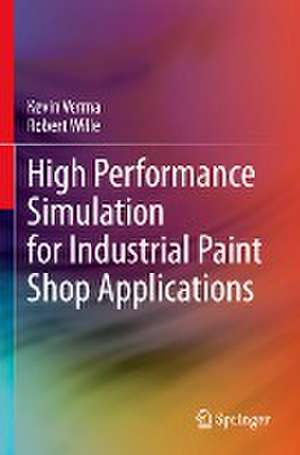High Performance Simulation for Industrial Paint Shop Applications
Autor Kevin Verma, Robert Willeen Limba Engleză Paperback – 30 apr 2022
| Toate formatele și edițiile | Preț | Express |
|---|---|---|
| Paperback (1) | 380.96 lei 6-8 săpt. | |
| Springer International Publishing – 30 apr 2022 | 380.96 lei 6-8 săpt. | |
| Hardback (1) | 387.38 lei 6-8 săpt. | |
| Springer International Publishing – 30 apr 2021 | 387.38 lei 6-8 săpt. |
Preț: 380.96 lei
Nou
Puncte Express: 571
Preț estimativ în valută:
72.92€ • 79.23$ • 61.29£
72.92€ • 79.23$ • 61.29£
Carte tipărită la comandă
Livrare economică 21 aprilie-05 mai
Preluare comenzi: 021 569.72.76
Specificații
ISBN-13: 9783030716271
ISBN-10: 3030716279
Pagini: 145
Ilustrații: IX, 145 p. 56 illus., 33 illus. in color.
Dimensiuni: 155 x 235 mm
Greutate: 0.25 kg
Ediția:1st ed. 2021
Editura: Springer International Publishing
Colecția Springer
Locul publicării:Cham, Switzerland
ISBN-10: 3030716279
Pagini: 145
Ilustrații: IX, 145 p. 56 illus., 33 illus. in color.
Dimensiuni: 155 x 235 mm
Greutate: 0.25 kg
Ediția:1st ed. 2021
Editura: Springer International Publishing
Colecția Springer
Locul publicării:Cham, Switzerland
Cuprins
Introduction.- Background.- Overview of grid-based methods.- Simulation of Electrophoretic Deposition Coatings.- Overview of volumetric decomposition methods.- Volumetric Decomposition on Shared Memory Architectures.- Volumetric Decomposition on Distributed Memory Architectures.- Overview of particle-based methods.- SPH on Multi-GPU Architectures.- SPH Variants on Multi-GPU Architectures.- Conclusion.
Notă biografică
Kevin Verma received his bachelor's and master's degree in Embedded Systems from the University of Applied Sciences Upper Austria, Hagenberg, Austria in 2013 and 2015, respectively. In 2020, he received his PhD in Computer Science from the Johannes Kepler University Linz, Linz, Austria. His research interests include High Performance Computing, Computational Fluid Dynamics and modeling and simulation of complex applications. In this area, he has published several papers in journals, international conferences and peer-reviewed workshops.
Robert Wille is Full Professor at the Johannes Kepler University Linz, Austria, and Chief Scientific Officer at the Software Competence Center Hagenberg, Austria. He received the Diploma and Dr.-Ing. degrees in Computer Science from the University of Bremen, Germany, in 2006 and 2009, respectively. Since then, he worked at the University of Bremen, the German Research Center for Artificial Intelligence (DFKI), the University of Applied Science ofBremen, the University of Potsdam, and the Technical University Dresden. Since 2015, he is working in Linz/Hagenberg. His research
Robert Wille is Full Professor at the Johannes Kepler University Linz, Austria, and Chief Scientific Officer at the Software Competence Center Hagenberg, Austria. He received the Diploma and Dr.-Ing. degrees in Computer Science from the University of Bremen, Germany, in 2006 and 2009, respectively. Since then, he worked at the University of Bremen, the German Research Center for Artificial Intelligence (DFKI), the University of Applied Science ofBremen, the University of Potsdam, and the Technical University Dresden. Since 2015, he is working in Linz/Hagenberg. His research
Textul de pe ultima copertă
This book describes the current state of the art for simulating paint shop applications, their advantages and limitations, as well as corresponding high-performance computing (HPC) methods utilized in this domain. The authors provide a comprehensive introduction to fluid simulations, corresponding optimization methods from the HPC domain, as well as industrial paint shop applications. They showcase how the complexity of these applications bring corresponding fluid simulation methods to their limits and how these shortcomings can be overcome by employing HPC methods. To that end, this book covers various optimization techniques for three individual fluid simulation techniques, namely grid-based methods, volumetric decomposition methods, and particle-based methods.
- Provides the necessary background on fluid simulations, both from the perspective of simulation and high-performance computing;
- Discusses details of HPC methods used to make corresponding methods applicable to even very complex, realistic problems, such as industrial paint shop applications;
- Provides not only theoretical background on the covered methods, but also shows their application to actual problems from the automotive industry.
Caracteristici
Provides the necessary background on fluid simulations, both from the perspective of simulation and high-performance computing Discusses details of HPC methods used to make corresponding methods applicable to even very complex, realistic problems, such as industrial paint shop applications Provides not only theoretical background on the covered methods, but also shows their application to actual problems from the automotive industry
